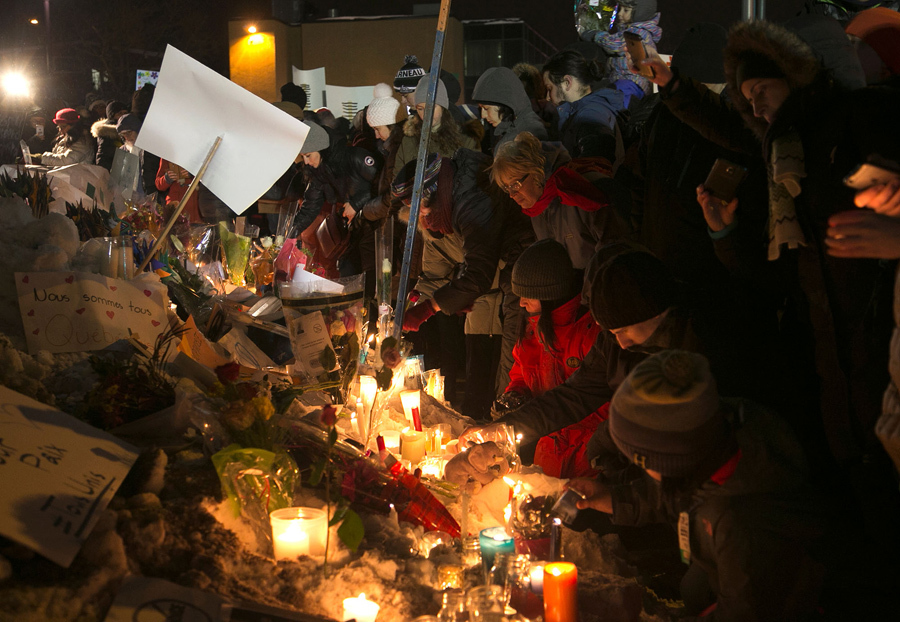The human condition characterized by marvelous giftedness yet ugly sinfulness-has once again captured headlines. On Sunday, 29 January, a young man that some describe as bright, yet reserved, savagely cut down 6 Muslim men and injured 19 others as they worshiped at the Centre Cultural Islamique de Quebec. One cannot help but be reminded of Blaise Pascal's description of humanity as the "glory and shame of the universe."
Just days before the murderous thundercracks of that tragedy, I heard a much different noise in Quebec, albeit in Montreal. I was privileged to participate in a public dialogue with a Muslim Sheikh and a Jewish Rabbi before an audience of hundreds at McGill University to discuss our commonalities and differences on the topics of justice and forgiveness. It was an evening characterized by a free exchange of ideas and polite-even friendly-discussions of our differences. Those in the audience displayed graciousness, humility, and curiosity about other peoples' views. Even before the event began, I had the honor of having dinner with Muslim and Jewish students who helped organize the event. The sounds that emanated from that dinner table and from the microphones later that evening were laughter, courtesy, and respect. Our deep and real differences of beliefs can have the power to bring us together.

People leave candles and flowers across from the Quebec Islamic Cultural Centre on January 30, 2017.
Like a fire alarm in the middle of a peaceful night, Sunday night's gunfire was a jarring reminder that there are those who don't see differences as an opportunity to have dialogue. Rather, some see differences as motivation to hate. In Montreal, Jews, Muslims, and Christians discussed commonalities and differences on justice and forgiveness, which are two cornerstones of our shared humanity. But what warped sense of justice must the Quebec City killer have had, if any? What sense of forgiveness or graciousness must have been missing in his heart?
What I can confidently say is that he did not respect the fact that his victims are made in God's image (Gen. 1:26). The biblical claim is that we are all made in God's image-regardless of our ethnic, religious, or political backgrounds. That means that none of us has the right to violate another person because there really is no "us" and "them." We are all made in God's image, but we all have fallen short of what it means to live like it. We tend to forget that or, more likely, outright ignore that in our latest cultural obsession with "us" and "them." We no longer disagree with dignity. We Hitler-ize those who don't agree with us. As our colleague Os Guinness has remarked, when we think about justice what we really mean is "just us."
And so this atrocity (and it was nothing less) will become a tool for politics, shaming, and blaming. What did the killer like? Who did he follow in social media? What were his politics? We've got to blame not only the killer, but also anyone he even tangentially associates himself with. There are reports that he had an affinity for Donald Trump, French politician Marine Le Pen, and outspoken atheist Richard Dawkins. Shall we drag all of them through this to provide meat for our ever widening jaws of outrage toward "them"? Or, should we take a moment, pause from our outrage gluttony, and simply mourn with those who mourn and pray for others even if they aren't like us in appearance and belief? The reality is that these victims-from the deceased to the injured to the traumatized-are part of a morbid fraternity of humanity, the only membership criterion for which is brutalization.
One of the mosque-goers, Amel Henrichi, tearfully said that the place of worship that once brought her peace will now "remind us that humans make mistakes. It will remind us that there are people in the world who don't accept difference." Perhaps the sorrowful Ms. Henrichi was being gracious in saying that "humans make mistakes." I like to think that she was. The reality is that what happened was sinful. It was evil. As Jesus said, "For out of the heart come evil thoughts, murder, adultery, sexual immorality, theft, false witness, slander. These are what defile a person" (Matt. 15:19-20). They are also what hurt other people.
It is this condition that Christ came to fix. Not through words only, but also through action. That's what the cross is all about. Jesus shed no one's blood but his own so that death would have no sting for us if we but trust what he's done. There will be opportunities to discuss that claim. But for now, in the wake of what has happened to the Muslim community of Quebec City and beyond, let us mourn with those who mourn and comfort those who grieve.
Reprinted by permission of Ravi Zacharias International Ministries, www.rzim.org.














